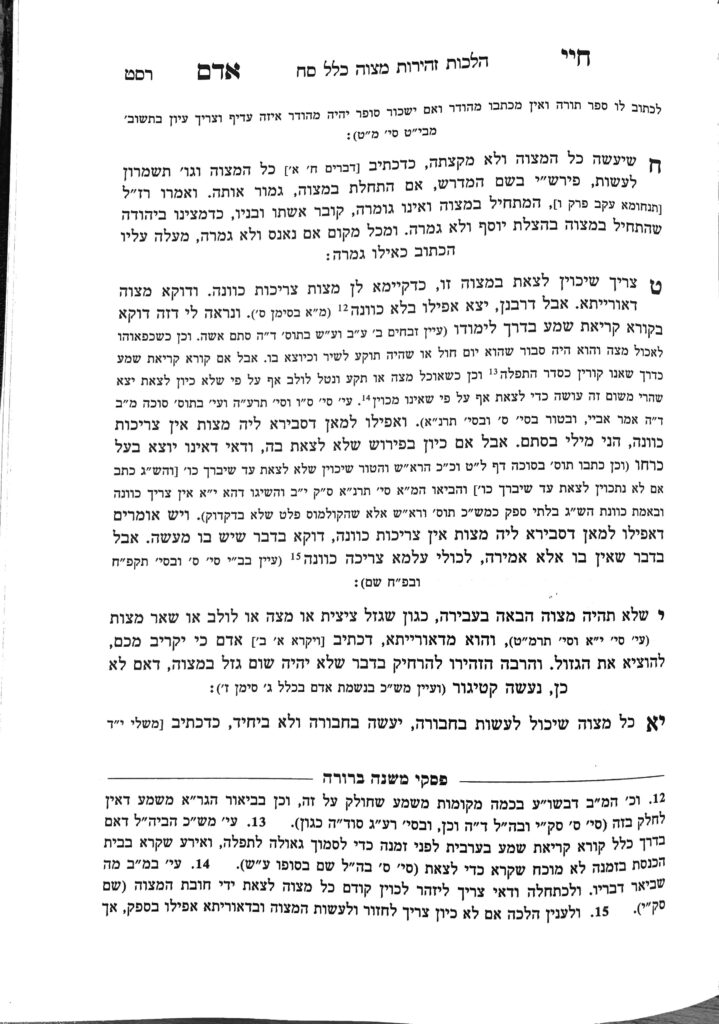We are beginning siman 9, which discusses the concept of mitzvos tzrichos kavana. Before we see the language of the Chayei Adam, we will clarify a few points.
The Gemara in Nedarim states from Rav Elazar B’Rav Tzadok that asei devarim l’sheim pa’olan, a person should do mitzvos for the sake of the One who commanded them. In other words, a person should fulfill the mitzvos because Hashem commanded them. The machlokes whether mitzvos tzrichos kavana or not is not a machlokes whether one should have this kavana of asei devarim l’sheim pa’olan in mind, as all agree that lechatchilla one should certainly have this kavana. The machlokes is whether having this kavana is me’akeiv or not.
The Rambam understands that the source for the chiyuv tefillah is the pasuk u’leovdo b’chol levavchem, and therefore one is chayav to daven, mideoraysa, once per day. In his glosses to Sefer Hamitzvos, the Ramban disagrees, and understands the pasuk of u’leovdo b’chol levavchem to mean that when one serves Hashem through the mitzvos, they should serve Hashem for the sake of the mitzvah. (The Ramban holds there is no chiyuv deoraysa to daven on a regular basis, but only when one experiences tzaar.) According to the Ramban, when a person fulfills a mitzvah for sake of the mitzvah, they fulfill an additional mitzvah asei of u’leovdo b’chol levavchem. If one does not have this kavana, they will not fulfill this mitzvas asei of u’leovdo b’chol levavchem, but they will still fulfill the mitzvah they were performing. However, this point is not our discussion either, as all would agree that once someone is having kavana, they should certainly have kavana for the sake of the mitzvah.
Our discussion regards when one performs a mitzvah, but does not think about the fact that they are performing the mitzvah for the sake of fulfilling the mitzvah. (We are not discussing kabbalistic intentions, but simply having the intention to fulfill the mitzvah.)
For example, the Gemara discusses a person who blows shofar because they enjoy the musical sounds. One opinion in the Gemara is that a person can fulfill their mitzvah through such blowing, because they have fulfilled the requirements. Another opinion in the Gemara is that one is not yotzei, because motivation will determine whether one fulfills their obligation.
The machlokes in this Gemara appears to be whether it is the action or the intention that is the primary component of the mitzvah. One opinion holds that having the action performed is sufficient, and that is the primary understanding of a mitzvah, i.e., that Hashem wants the action to occur. The other opinion holds that without intention, the action is not considered a mitzvah, as the point of a mitzvah is not the action alone, but the fact that one is using this as a vehicle to serve Hashem.
The above points of u’leovdo b’chol levavchem and asei devarim l’sheim pa’olan should certainly be fulfilled as well, but our siman will focus on this basic intention.
Summary
The concept of mitzvos tzrichos kavana refers to having the basic intention to fulfill a mitzvah when performing an action.
One should always do mitzvos l’sheim mitzvah.
According to the Ramban, one fulfills a separate mitzvas asei by having this kavana, besides the mitzvah which one is acting upon.



